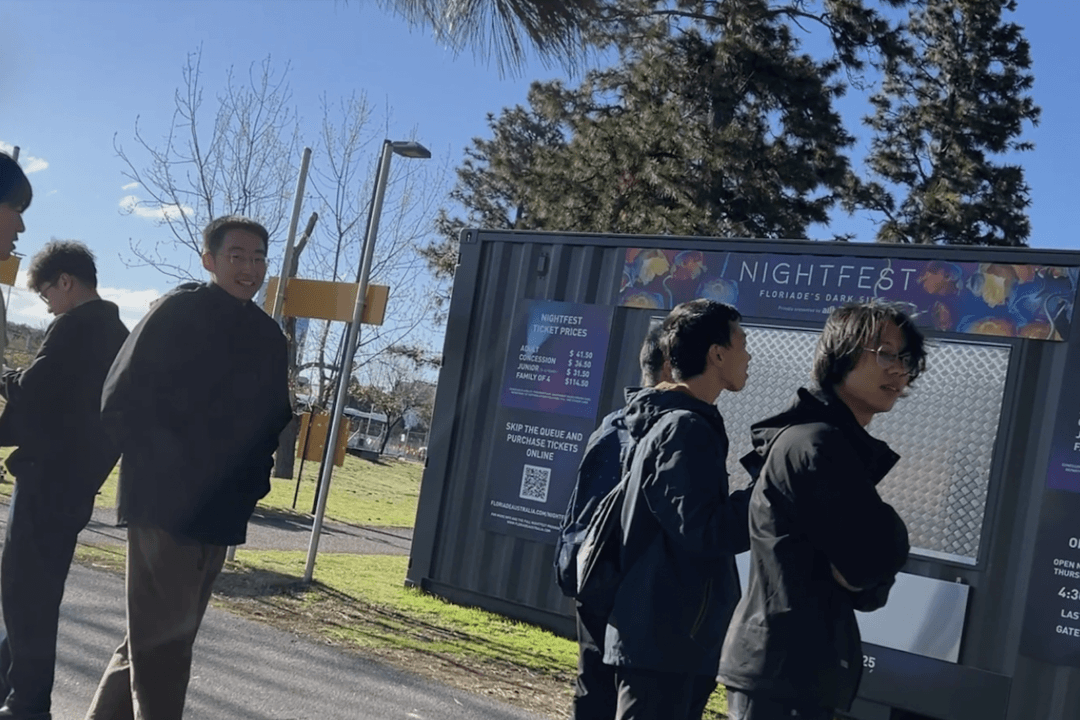What should have been a peaceful day for Nancy Dong at Canberra’s annual Floriade festival, has once again turned into an ordeal.
Just after 3.30 p.m. on Sept. 20, Dong and two fellow Canberrans say they were approached by a group of young Chinese men and verbally taunted.
Dong, along with Floria Mao and Alice Lu, are Falun Gong practitioners and were demonstrating the exercises and distributing flyers at Floriade, the Australian capital’s annual flower and entertainment festival.
They say young male walked up to Floria Mao and said in Mandarin, “We are here to attack you!”
According to Dong, the students repeated a series of defamatory allegations initially disseminated by Chinese state media, later echoed via Chinese social media and Western media outlets.
They included comments criticising Falun Gong, its founder, and Shen Yun, a performing arts company aimed at reviving traditional Chinese culture.
Dong says the incident lasted 10 minutes with the men filming the exchange.

The incident was reported to Australian Capital Territory (ACT) Policing but since no physical altercation occurred, the matter did not proceed. The Epoch Times also contacted ACT Policing and the organisers of Floriade, Events ACT.
“We are aware protest action occurs outside Floriade’s event site. Events ACT takes any incident of this nature seriously and would respond appropriately if reported to our team on site,” the ACT government told The Epoch Times.
Alice Lu, who has lived in Australia for 14 years, says she feels the student’s comments sounded rehearsed.
“[He] repeatedly echoed the CCP’s slanders against Falun Gong with a consistent tone,” she told The Epoch Times.
Falun Dafa, also known as Falun Gong, is a spiritual practice that combines meditative exercises with teachings based on the principles of truthfulness, compassion, and tolerance.
After its introduction to the public by Li Hongzhi in China in 1992, the practice has spread globally, with millions of practitioners across 100 countries.
Seeing the growing popularity of the practice as a challenge to its authority, former CCP leader Jiang Zemin launched a violent crackdown on Falun Gong practitioners in July 1999.
The persecution, which includes widespread human rights abuses such as forced organ harvesting in mainland China, also extended overseas with the CCP leveraging overseas Chinese community groups and Western institutions to further its aims.

Assaulted for a Sign That Criticises the CCP
During the 2022 Floriade, Dong was physically assaulted by two Chinese men after she caught them vandalising her car, which carried signage criticising the CCP.Despite suffering bruising, heart pains, and nervousness after the incident, Dong still held out hope that her assailant could come around.
“I hope that you can understand that CCP is not China. Please do not hurt others again in the name of patriotism, and please respect others’ freedom of expression,” Dong said at the time.

Global Concerns About Transnational Repression
The latest Floriade incident comes amid a recent warning from the Group of Seven nations about “transnational repression” (TNR)—a more “aggressive form” of foreign interference.The strategy deploys a range of methods that creates a “chilling effect” on speaking out against human rights abusers or publicly calling out overseas regimes that engage in the activity.
“TNR often impacts dissidents, journalists, human rights defenders, religious minorities, and those identified as part of diaspora communities,” the G7’s statement said.
Meanwhile, New Zealand authorities have outright blamed the CCP for being the “most active“ foreign regime trying to manipulate its government and society.
Chinese Student Threatens Shop Owner to Remove Epoch Times
In fact, incidents have been recorded as early as 2015.At the Australian National University in Canberra, a Chinese student representative pressured the campus chemist to remove free copies of the Chinese-language Epoch Times. The Epoch Times was founded in 2000 to report on the persecution against Falun Gong.

The owner recalled that very few Chinese students actually glanced at the newspaper, with even fewer taking copies.
“That’s why I was so surprised at the man’s outburst,” she said.
The man who demanded the removal was identified as the head of the university’s Chinese Students and Scholars Association (CSSA).






